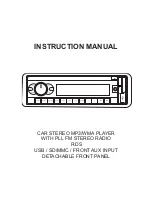
Polycom, Inc.
C-1
Appendix C
CDR Fields - Unformatted File
The CDR (Call Detail Records) utility is used to retrieve conference information to a file. The
CDR utility can retrieve conference information to a file in both formatted and unformatted
formats.
Unformatted CDR files contain multiple records. The first record in each file contains
information about the conference in general, such as the conference name and start time. The
remaining records each contain information about one event that occurred during the
conference, such as a participant connecting to the conference, or a user extending the length
of the conference. The first field in each record identifies the event type, and this is followed
by values containing information about the event. The fields are separated by commas.
Formatted files contain basically the same information as unformatted files, but with the
field values replaced by descriptions. Formatted files are divided into sections, each
containing information about one conference event. The first line in each section is a title
describing the type of event, and this is followed by multiple lines, each containing
information about the event in the form of a descriptive field name and value.
The MCU sends the entire CDR file via API or HTTP, and the RMX or external application
does the processing and sorting. The RMX ignores events that it does not recognize, that is,
events written in a higher version that do not exist in the current version. Therefore, to
enable compatibility between versions, instead of adding new fields to existing events, new
fields are added as separate events, so as not to affect the events from older versions. This
allows users with lower versions to retrieve CDR files that were created in higher versions.
The field names and values in the formatted file will appear in the language being used for the
RMX
Web Client
user interface at the time when the CDR information is retrieved.
The value of the fields that support Unicode values, such as the info fields, will be stored in the CDR
file in UTF8. The application that reads the CDR file must support Unicode.
This appendix describes the fields and values in the unformatted CDR records.
Although the formatted files contain basically the same information, in a few instances a single field in
the unformatted file is converted to multiple lines in the formatted file, and in other cases, multiple
fields in the unformatted file are combined into one line in the formatted file.
In addition, to enable compatibility for applications that were written for the MGC family, the
unformatted file contains fields that were supported by the MGC family, but are not supported by the
RMX, whereas these fields are omitted from the formatted file.
Summary of Contents for RealPresence 2000
Page 26: ...RealPresence Collaboration Server RMX 1500 2000 4000 Administrator s Guide xxiv Polycom Inc...
Page 842: ...RealPresence Collaboration Server RMX 1500 2000 4000 Administrator s Guide 23 60 Polycom Inc...
Page 962: ...RealPresence Collaboration Server RMX 1500 2000 4000 Administrator s Guide E 4 Polycom Inc...
Page 968: ...RealPresence Collaboration Server RMX 1500 2000 4000 Administrator s Guide F 6 Polycom Inc...
Page 1128: ...RealPresence Collaboration Server RMX 1500 2000 4000 Administrator s Guide J 18 Polycom Inc...
















































